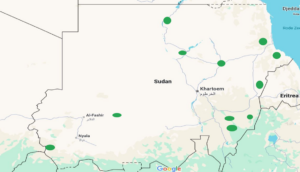Flood damage to crops will ‘exacerbate’ food insecurity in Sudan
As Sudan’s rainy season draws to a close, the number of people affected by seasonal rains and flash floods across Sudan has remained constant at 349,000 since 26 September, according to the UN Office for the Coordination of Humanitarian Affairs (OCHA).
 Cotton harvest in El Gezira (File photo: Sudan Vision Daily)
Cotton harvest in El Gezira (File photo: Sudan Vision Daily)
As Sudan’s rainy season draws to a close, the number of people affected by seasonal rains and flash floods across Sudan has remained constant at 349,000 since 26 September, according to a report by the UN Office for the Coordination of Humanitarian Affairs (OCHA) published this morning.
146 people have died and 122 have been injured due to flooding and torrential rains since June, according to the National Council for Civil Defence.
At least 24,860 homes have been destroyed and 48,250 homes have been damaged in 16 out of the 18 states, and farmers have reportedly lost over 4,800 heads of livestock, and over 12,100 feddans of agricultural land have been affected by floods.
The OCHA report warns that “this will exacerbate the already worrying levels of food insecurity people across the country face.” Economic expert and politician Sidgi Kaballo recently warned of a ‘revolution of the hungry’ in an interview with Radio Dabanga if the root causes of the economic problems are not addressed.
The rainy season in Sudan usually starts in June and lasts up to September, with the peak of rains and flooding observed between August and September. “This year, the number of flood-affected people surpassed those affected in 2021 (about 314,500). Annually, an average of 388,600 people were affected by floods between 2017 and 2021,” reported OCHA.
According to the report, the most affected states are South Darfur (79,937 people), El Gedaref (64,685 people), Central Darfur (41,747), White Nile State (34,357), and Kassala (25,890). Less affected states are Northern State (18,046), West Darfur (17,354), River Nile State (16,572), North Kordofan (15,235), El Gezira (8,715), West Kordofan (6,030), South Kordofan (5,768), Sennar (5,379), and East Darfur (3,650). Floods and torrential rains have had limited impact in Khartoum (2,741) and North Darfur (2,621).
Many economic experts are not convinced that increasing taxes is a good way to support Sudan’s economy. They warn that it will further increase the economic hardships of many Sudanese, who already struggle to make ends meet. Tax increases will eventually affect the consumer, and will lead to a weakening of purchasing power and reluctance to consume, economic analyst Hafiz Ismail told Radio Dabanga.











 and then
and then